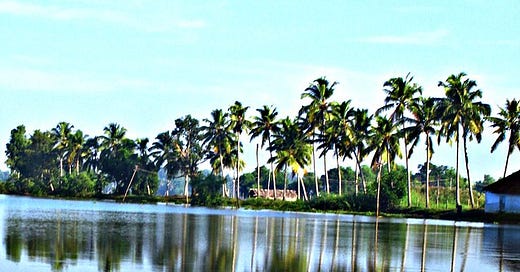Can We Even Imagine a Non-apocalyptic Future?
Lily Brooks-Dalton's The Light Pirate and future possibilities
All week, I’ve been dreaming about floods and oceans. I just finished reading both a manuscript by my friend Joshua Gottlieb-Miller’s for a hybrid poetry book that deals a lot with climate anxiety and Hurricane Harvey, and The Light Pirate by Lily Brooks-Dalton, set as Florida falls apart and submerges in the very near future.
A few years ago, I briefly dated another writer, which I really never do, even though we had swoony conversations about my use of consonants. Anyhow, he was working on a novel set a thousand years in the future. There were lots of wild things, including vampires, in the book, but the thing that flabbergasted me was that it was not a post-apocalyptic story. I realized I had never deeply imagined a future in which society as we know it hadn’t collapsed.
Reading Brooks-Dalton’s novel, I’ve been thinking about that again. The novel has a beautiful, hopeful, life-filled ending. I don’t want to give too much away. But a premise running inside the book (in the characters’ minds and borne out in their experiences) is that Western technological culture is a temporary and unsustainable blip on the planet. That its fall is inevitable.
There’s something really relieving about this thought. About a future where Florida is full of alligators instead of pavement. That, even through great change, the aliveness of the world goes on and triumphs. It’s relieving because life now is a constant anxious ecological and material tension. The living web of the planet feels very fragile, which makes our material survival feel very fragile, no matter how many packages of extraneous crap we have delivered to our doorsteps. We feel that fragility, and decide we need more of the very consumption that caused it to buffer ourselves against it. And then we feel gross and we wish that the whole disgusting charade was over, but it’s all hard to put our finger on (am I even now?) so we do things like storm the capitol.
What I mean is, Americans believe in apocalypse.
It’s either that or the robots, right?
I have always found something hopeful about the idea that great and drastic changes may some day come over our culture, bringing us into a more egalitarian and earthy way of living. I like this partly because I haven’t heard anybody articulate a vision of the future that isn’t either revolutionary, dystopian, or a tech-topia. And a future where we cede more of our lives to digital and AI interactions is to me, also dystopian. (The present is, in so many ways, also dystopian. Yet simultaneously the sun is shining low in the south, and I can hear kids playing and crows politicking and Squinchy sleeping, and in this moment is all the heaven I could ever need.)
Anyhow, I’ve always taken refuge in the idea of collapse (with me and my loved ones and our beloved ecosystems pluckily surviving, of course). It’s a kind of under-examined juvenile fantasy, mixed with the understanding that business as usual isn’t a sustainable thing. I was curious how easily Brooks-Dalton’s vision of it being blown/washed/burned away settled into my mind this week. To something in my brain, it felt like the obvious future.
It’s made me wonder what other options I could imagine. I’m embarrassed by how little of my imagination has gone into really imagining a future world I would want. I’m embarrassed for all of us.
Last night I was talking to some friends about how modern Western people are in the historical minority when we forget that all words are spells or prayers. We speak things into being. Let’s speak a future of flourishing.
So that’s my challenge for myself, and you if you care to join me: what does a non-apocalyptic culture-and-planet-flourishing future look like?
If you have ideas, or book rec’s of people who have ideas, put them in the comments, please!





Oh yeah, I did read that and then showed up in the Bay Area and was like, where is my star hawk utopia?
I read a book a long, long, long time ago by Starhawk that was attempting to answer your question. I read it so long ago that I can’t remember the plot but I remember the feeling of hope/joy/love I felt reading it. It was called The Fifth Sacred Thing. Have you read that? It was around the house forever. Don’t think I have it any more though. Otherwise I would lend it to you.